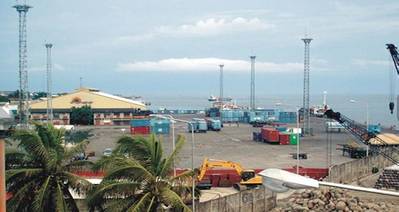Manila's Port Gridlock Squeezing Philippine Economy
Philippine furniture maker Betiscrafts Inc should have delivered a shipment of custom-made chairs to Middle East customers last month.
But a cargo from China of imported fabric needed for the upholstery has been held up by severe congestion at Manila's main port, where containers have piled up since February when a daytime ban on trucks plying the city roads came into effect.
Worried about the hit to the economy, the government intervened on Sept. 13 to end the 7-month long ban, although the move may have come too late for many companies that ship to Western markets for the critical Christmas season.
Electronics manufacturers, garment makers and food producers are facing delays and rising costs due to the backlog at the choked port, which handles more than 80 percent of foreign trade, holding back growth in Southeast Asia's fifth-largest economy.
"I never expected that the situation will turn as bad as this," Myrna Bituin, owner of Betiscrafts, sighed. "We are at a loss. We are under a lot of stress. I could not deliver, and if I don't deliver then my clients abroad will also lose business."
The port woes embody the huge challenges still facing President Benigno Aquino to modernise the country's dilapidated roads, ports and airports that are constraining growth.
"The port congestion has resulted in a stack of problems - stuck cargo, rising costs of transporting products by truck, as well as widespread traffic jams brought about by trucks queuing to collect cargo," the president said in what was billed as an agenda-setting speech earlier this month.
Annual growth in the second quarter quickened to 6.4 percent, the fastest in Asia after China, but Trade Secretary Gregory Domingo said this month the economy could have clocked 7 percent growth if not for the port problems.
"Congestion is complex and requires strategic action in many different directions. Like most problems, it took a short time to occur but it is going to take a long time to solve," said Christian Gonzalez, Head of the Asia-Pacific Region at International Container Terminal Services Inc.
Earnings, Govt Revenue Hit
The port gridlock was an unintended consequence of a local government plan to improve traffic and reduce pollution in the city of Manila - the truck ban on the city's roads lasted for 16 hours daily from 5 am.
In a sign of the impact, imports fell in annual terms in May and June, and exports slowed in July. Data on Thursday is expected to show a third month of declines for imports.
Some firms have reduced hours or put workers on unpaid leave, pointing to weakness in production, said Sergio Ortiz-Luis, President of the Philippine Exporters Confederation.
The government is worried too. Tax collections in August came in $339 million below target, and the main tax agency blamed the supply-chain mess for crimping corporate profits.
With the backlog of 20,000 containers expected to take months to clear, there are worries about the impact on exporters of electronics goods, the nation's biggest foreign exchange earner after remittances from overseas workers.
Lonely Christmas
Dan Lachica, President of the Semiconductor and Electronics Industries in the Philippines, Inc (SEIPI) said he knew one company lost 50 percent of its contracted volume to a competitor overseas.
"If you don't fix the problem, that 50 percent will increase and could ultimately lead to the company shutting down."
As well as just delaying trade, the gridlock has cost some firms business as they have worried about letting customers down leading into the Christmas season.
Starwood Manufacturing, which exports photo frames and a host of wooden home decor items, said it had to decline $75,000 of additional Christmas orders for fear they might not reach clients in the United States on time.
"We really have to deal with this on our own because the damage will be on us - our relationship with our clients, our future business and our orders," said Evelyn Tan, production manager at Starwood.
(By Karen Lema; Additional reporting by Neil Jerome Morales; Editing by Shri Navaratnam)











